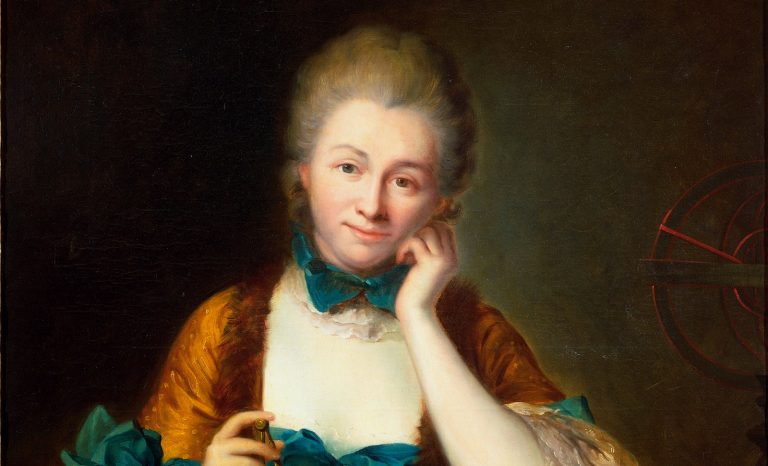Émilie Du Châtelet

In the annals of history, the name Émilie Du Châtelet stands as a beacon of intellectual prowess and a testament to the power of perseverance in a world often dominated by male scholars. Born on December 17, 1706, in Paris, France, Émilie Du Châtelet, or Gabrielle Émilie Le Tonnelier de Breteuil, was destined to challenge societal norms and make her mark in the fields of mathematics, physics, and philosophy.
Her contributions, though often overshadowed by her male counterparts, have left an indelible impact on the scientific community, shaping the very foundations of modern physics and mathematics. This article aims to delve into the life and achievements of Émilie Du Châtelet, exploring her remarkable journey and the legacy she left behind.
A Life of Academic Excellence

Émilie Du Châtelet's academic prowess was evident from a young age. Born into an aristocratic family, she received a privileged education, which was rare for women during the early 18th century. Her father, a distinguished nobleman, recognized her intellectual capabilities and encouraged her pursuit of knowledge.
Under the tutelage of private tutors, Du Châtelet developed a deep passion for mathematics and the sciences. She mastered Latin, Greek, and several other languages, enabling her to delve into the works of renowned philosophers and scientists of her time. Her early studies laid the foundation for her future contributions to the world of academia.
The Mentor: Voltaire
A pivotal moment in Du Châtelet's life occurred when she crossed paths with the celebrated French Enlightenment philosopher and writer, Voltaire. Their intellectual partnership blossomed into a lifelong friendship and collaboration, with Du Châtelet providing a stimulating environment for Voltaire's philosophical and literary pursuits.
Voltaire, recognizing Du Châtelet's exceptional intellect, became her mentor and encouraged her to delve deeper into the world of science and philosophy. Together, they embarked on a journey of intellectual exploration, challenging conventional wisdom and pushing the boundaries of human understanding.
Mathematical and Scientific Endeavors

Émilie Du Châtelet's mathematical genius was unparalleled for her time. She made significant contributions to the field of mathematics, particularly in the area of calculus. Her work on the analytical mechanics of Isaac Newton laid the groundwork for future advancements in physics and mathematics.
Du Châtelet's translation and commentary on Newton's "Philosophiæ Naturalis Principia Mathematica" (commonly known as the "Principia") is considered one of her most remarkable achievements. This extensive work, published posthumously in 1759, provided a comprehensive French translation of Newton's groundbreaking treatise, making it accessible to a wider audience.
| Contribution | Description |
|---|---|
| Translation of "Principia" | Du Châtelet's French translation of Newton's "Principia" made the work accessible to French scientists and philosophers, fostering a deeper understanding of Newtonian mechanics. |
| Analytical Mechanics | Her work on analytical mechanics extended Newton's theories, providing a mathematical framework for understanding the behavior of physical systems. |
| Optimism and Materialism | In her philosophical works, Du Châtelet explored optimism and materialism, challenging prevalent religious beliefs and advocating for a scientific understanding of the universe. |

Challenging Conventional Wisdom
Émilie Du Châtelet's intellectual curiosity knew no bounds, and she fearlessly ventured into philosophical debates that challenged the status quo. Her philosophical treatise, "Discours sur le bonheur" (Discourse on Happiness), explored the nature of human happiness and the role of optimism in shaping a fulfilling life.
In her philosophical writings, Du Châtelet advocated for a scientific approach to understanding the world, rejecting religious dogmatism and embracing the principles of materialism. She believed that a rational, empirical approach to knowledge would lead to a deeper understanding of the universe and a more fulfilling existence.
The Legacy of a Visionary
Émilie Du Châtelet's legacy extends far beyond her mathematical and philosophical contributions. She served as an inspiration and role model for future generations of women in STEM fields, demonstrating that intellectual prowess was not exclusive to men.
Her work paved the way for a more inclusive scientific community, encouraging women to pursue their passions and break free from societal expectations. Du Châtelet's unwavering dedication to knowledge and her ability to collaborate with some of the greatest minds of her time left an indelible mark on the intellectual landscape of the 18th century.
The Impact on Modern Science

Émilie Du Châtelet's contributions to physics and mathematics continue to resonate in the modern era. Her work on analytical mechanics and her translations of Newton's "Principia" laid the foundation for the development of classical mechanics and the understanding of physical laws.
Moreover, Du Châtelet's philosophical ideas, particularly her advocacy for a scientific understanding of the world, have influenced the development of modern scientific thought. Her emphasis on empirical evidence and rationality continues to shape the way scientists approach their research and understand the universe.
A Lasting Influence
Émilie Du Châtelet's life and achievements serve as a testament to the power of intellectual curiosity and the importance of challenging societal norms. Her work continues to inspire and guide scholars and scientists, reminding them of the immense potential that lies within every individual, regardless of gender or background.
As we reflect on the life of Émilie Du Châtelet, we are reminded that the pursuit of knowledge is a universal endeavor, and that brilliance knows no boundaries. Her legacy encourages us to embrace our intellectual passions, break free from limitations, and contribute to the collective advancement of human understanding.
FAQ
What was Émilie Du Châtelet’s greatest contribution to physics?
+
Du Châtelet’s translation and commentary on Isaac Newton’s “Principia” made this seminal work accessible to French scientists, influencing the development of classical mechanics.
How did Du Châtelet’s work impact women in STEM fields?
+
Her achievements served as an inspiration, demonstrating that women could excel in STEM, and paved the way for a more inclusive scientific community.
What philosophical ideas did Du Châtelet advocate for?
+
She promoted optimism and materialism, challenging religious beliefs and advocating for a scientific understanding of the universe.



